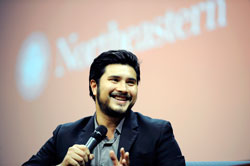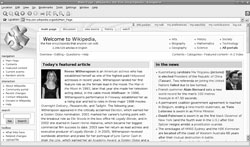The University’s Model United Nations (UN) team competed at the 65th session of Harvard University’s Model UN competition.
Eight students represented Monmouth at the Park Plaza Boston Hotel, this past weekend from Saturday, Feb. 14th through Sunday, Feb. 17th
Participants debated and negotiated policy resolutions on global challenges and crises facing the actual United Nations. The official UN rules and regulation were utilized.
Representatives from the University included: Head Delegates Kristen Gomez, a junior English student, and Daniel Gerdon, a sophomore political science student; Matt Gruhler, a junior political science student; Alexis Vasquez, a sophomore political science student; Amanda Lopez, a sophomore political science and history student; Nick Gibson, a sophomore political science student; Teniya Manu, a sophomore accounting student; and new-comer Fradley de la Cruz, a sophomore political science student.
Harvard Model UN is the oldest contest in the states, with over 150 universities from around the country and around the world, including Europe, Asia, the Middle East, Africa and Latin America participating.
University students were assigned to represent the Republic of Moldova on four separate committees. In preparation for the contest, students researched their country by reading both current and past events. Additionally, weekly meetings were held to prepare for their given speeches.
The delegation passed two resolutions, conveyed speeches from their committees, and effectively competed throughout the competition.
The Monmouth delegation consisted of the following students and their committees/issues: Gruhler and Vasquez (World Health Organization – Special Needs/Disability Protections and Antibiotic Resistance Regulations); Gibson and Manu (International Monetary Fund [IMF] – Loan Conditionality Options); Gerdon and Gomez (Legal Committee – Cyber-warfare); and de la Cruz and Lopez (Economic and Financial Committee – Human Capital Promotion and Green Energy Funding).
Kenneth Mitchell, Ph.D., Chair of the Department of Political Science and Sociology and an associate professor of political science, served as the faculty advisor on this trip.
Manu said, “I like the fact that I had a smaller committee in Harvard which had around 30 to 40 people compared to the usual 80 to 100 students. This allowed all the students to get to know each other and form connections.”
“Typically, students are exposed to information in a one-directional manner. Students take a class on a particular topic and learn from the professor,” noted Kevin Dooley, Ph.D., an associate professor of political science and an adviser for the University’s Model UN team.
Dooley explained that Model UN forces students to learn about issues and then debate them as if they were representatives of certain countries.
“It makes it more interesting and more meaningful. It also strengthens research, writing, and public speaking skills,” he said.
Manu said, “My one piece of advice for someone who wants to join Model UN is to really work hard in the club because what you gain from it is very much worth it such as getting to travel, networking, improving skills such as public speaking and communication etc.”
“This competition was challenging because we had a very complex topic, which is IMF loan conditionality. It took some time and effort to truly understand what the topic entailed,” she added.
In the upcoming week, the University’s Model UN team will send a 6-student delegation to the London Model UN contest where it will try to defend its “Best Delegation” title from last year.
During the last week of March, a 25-student delegation will compete at the Charlotte, NC contest.



